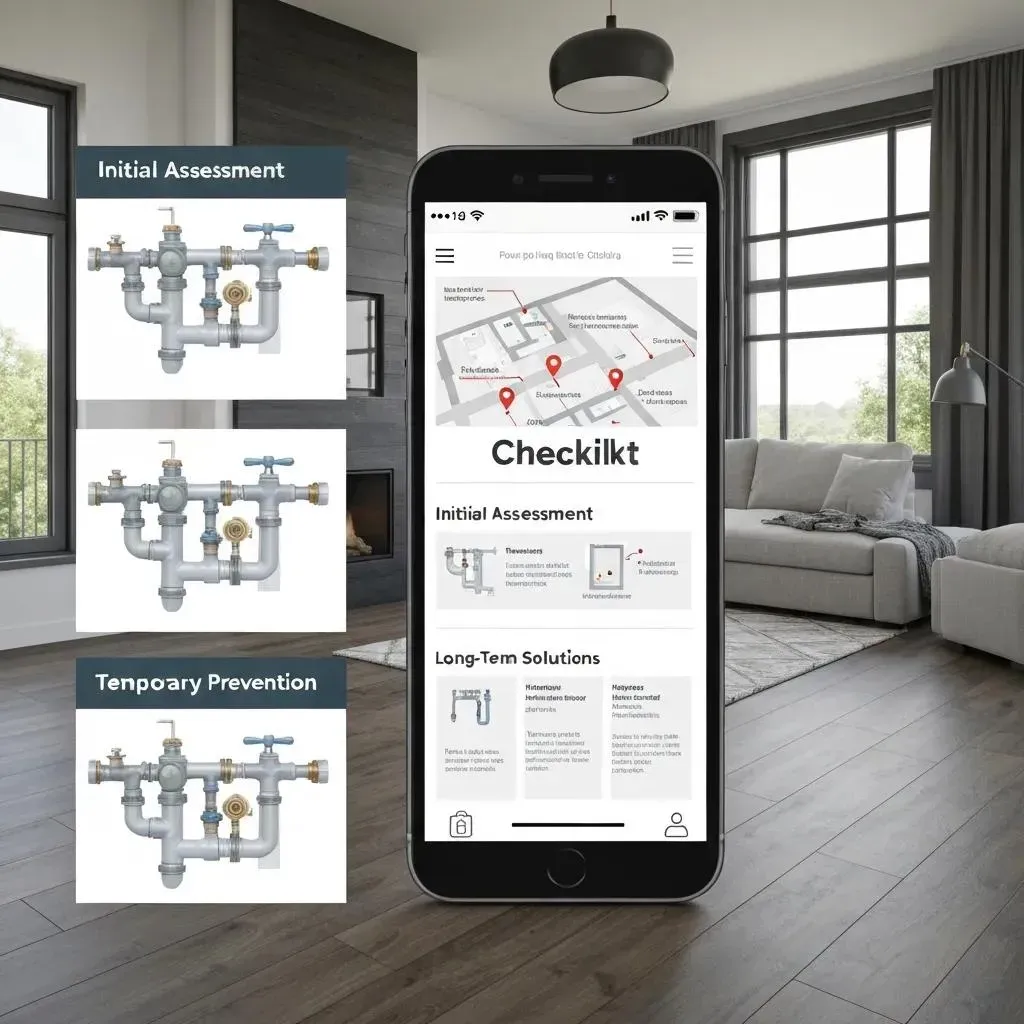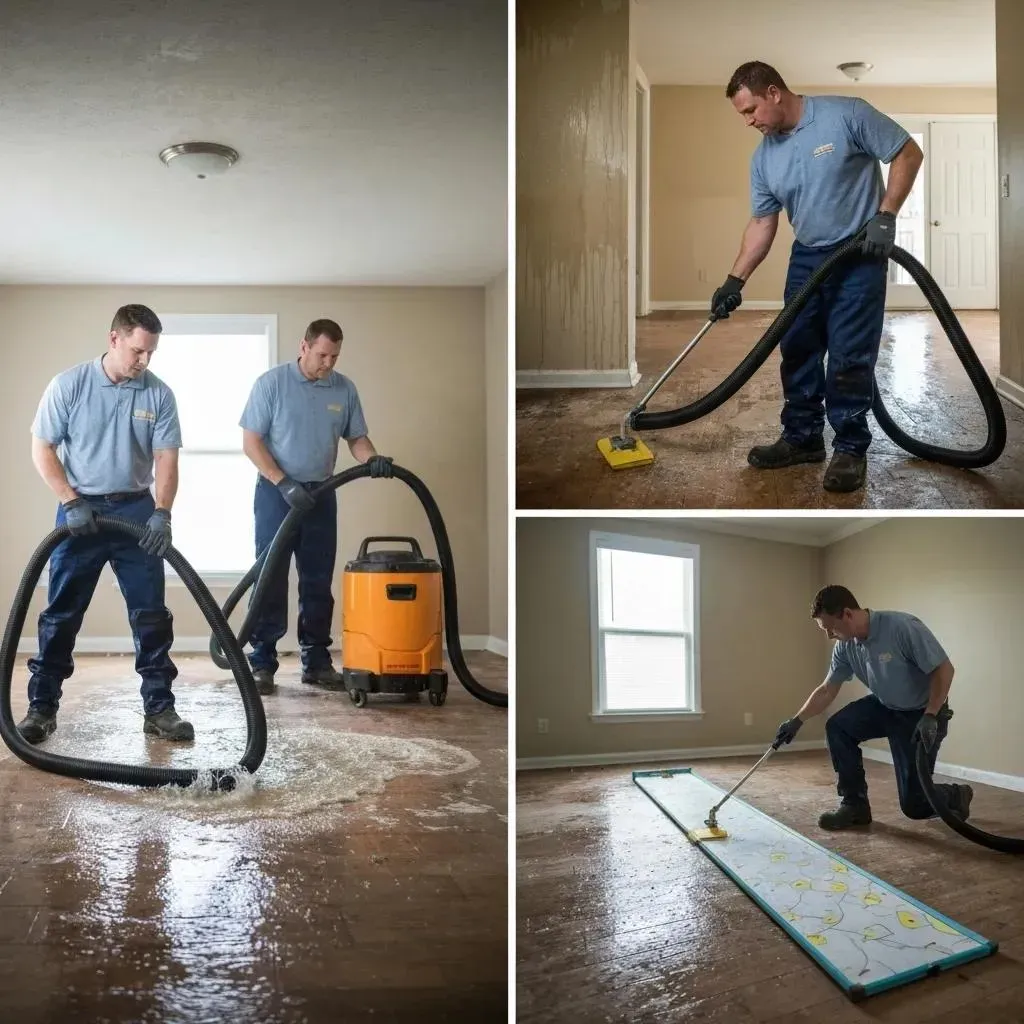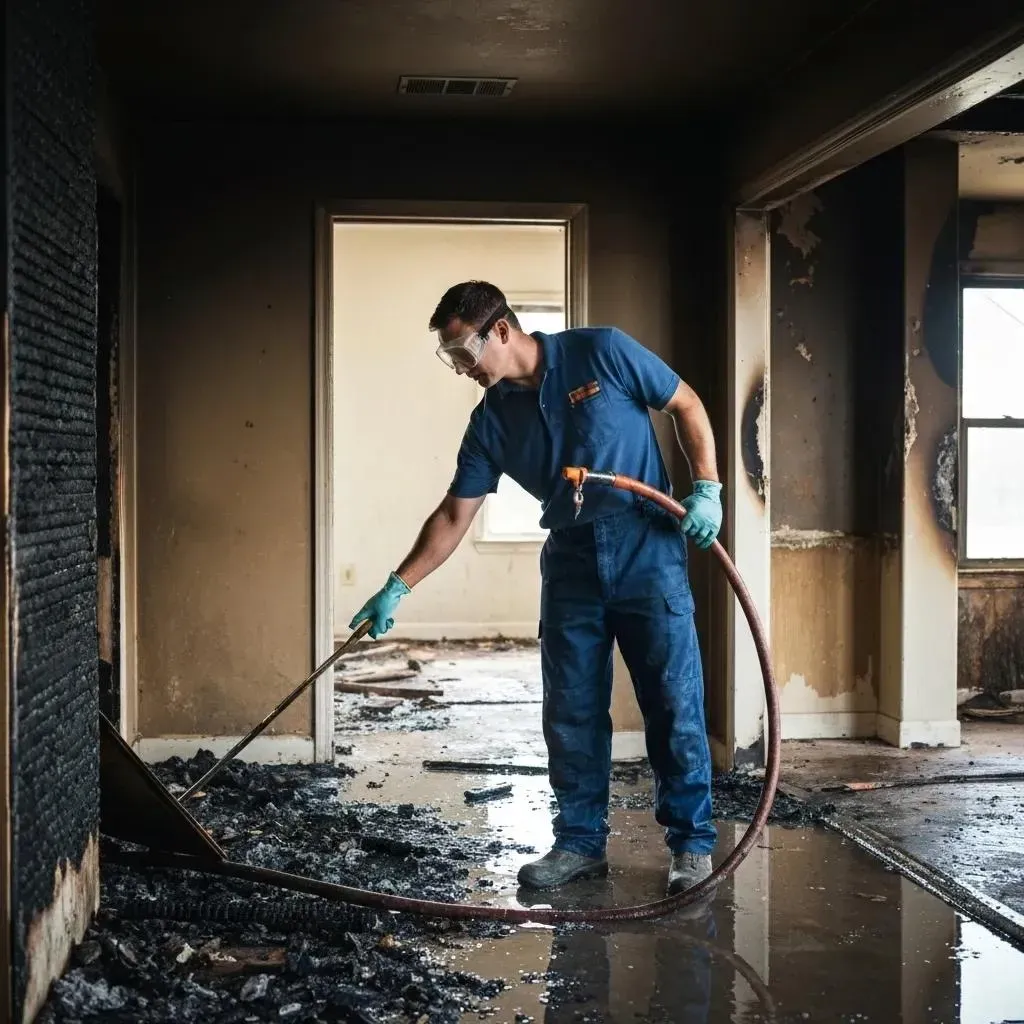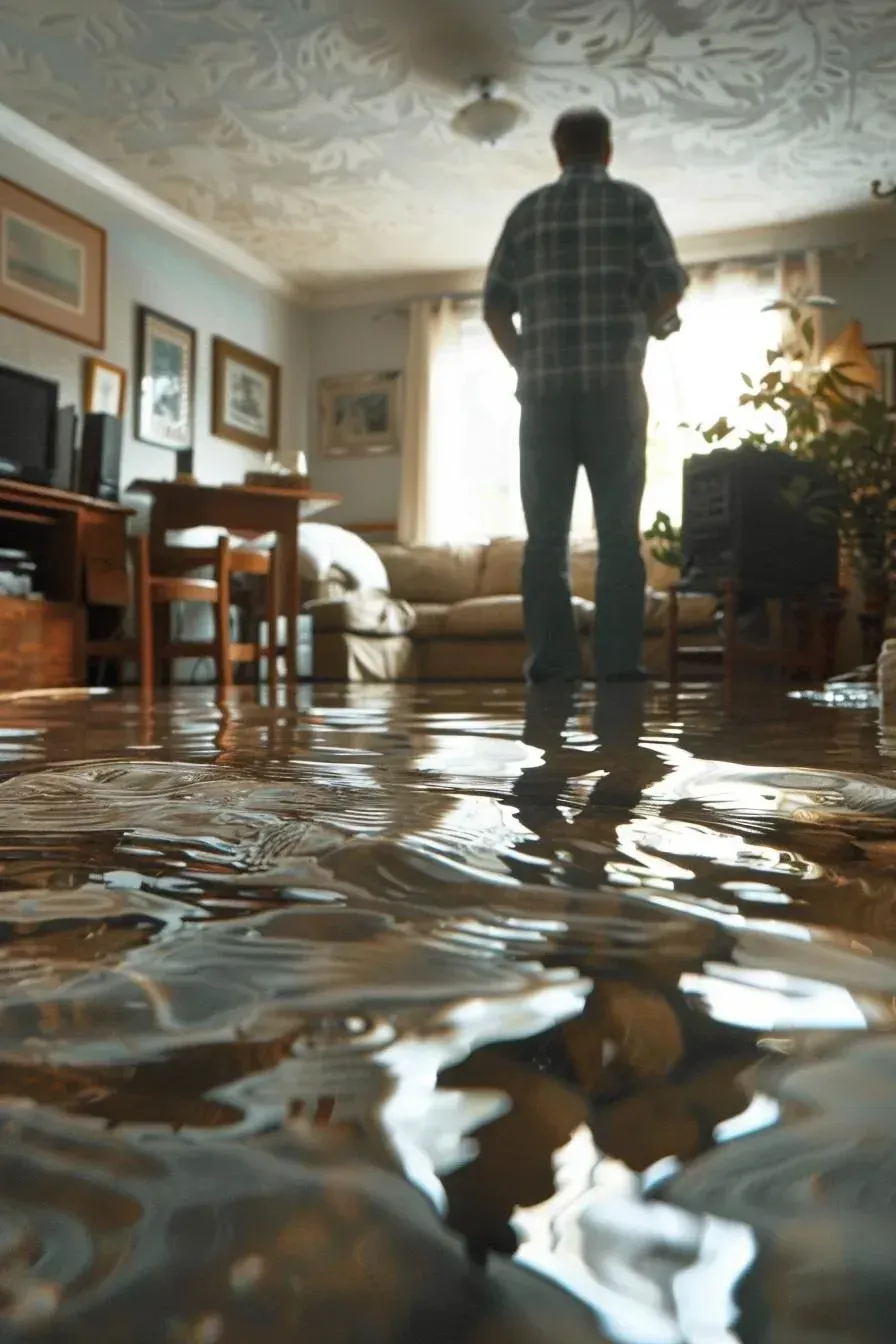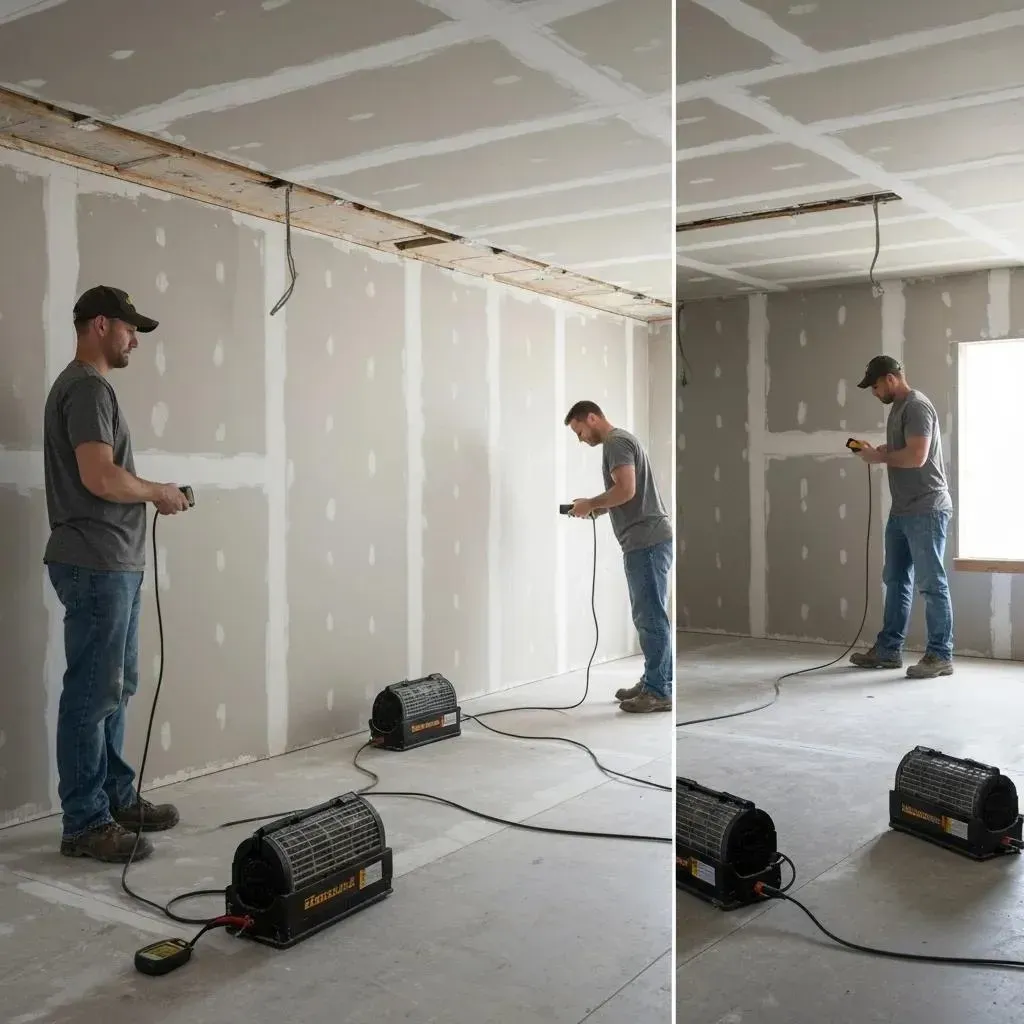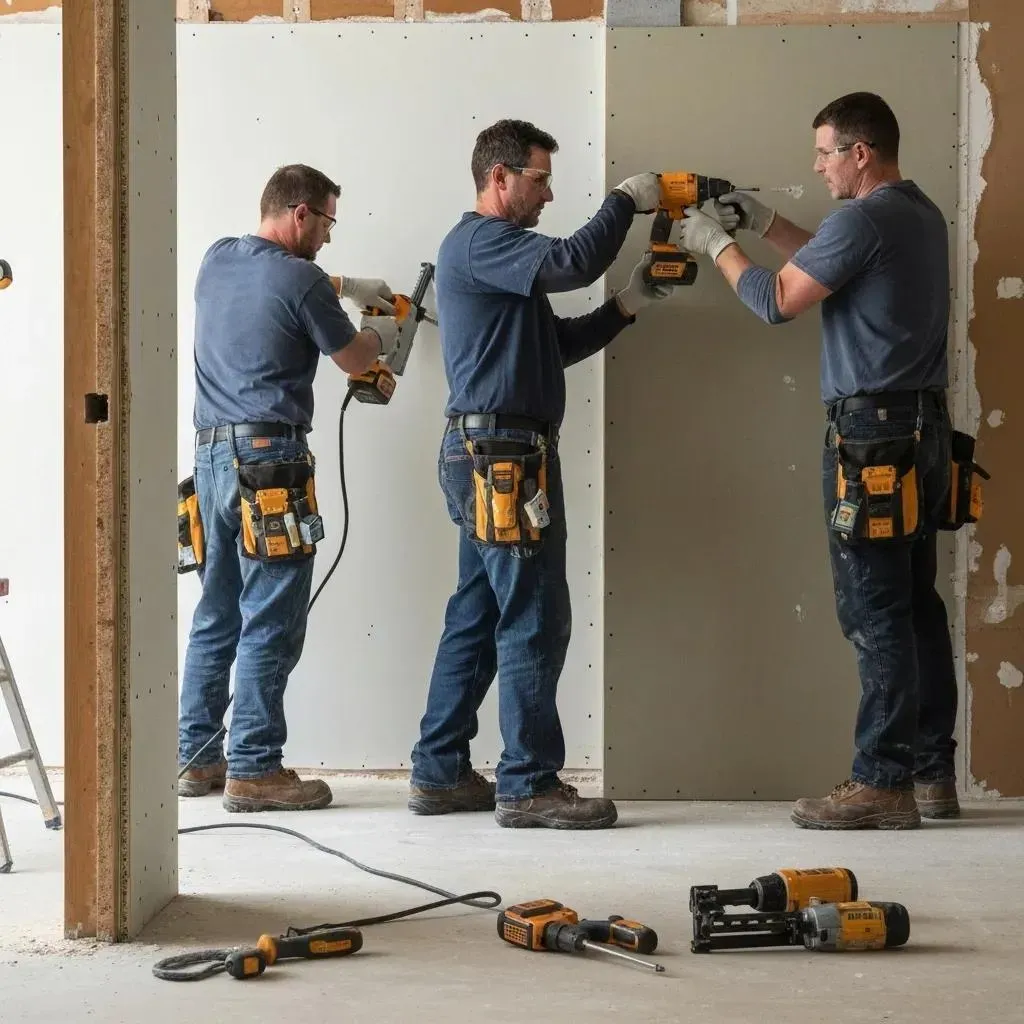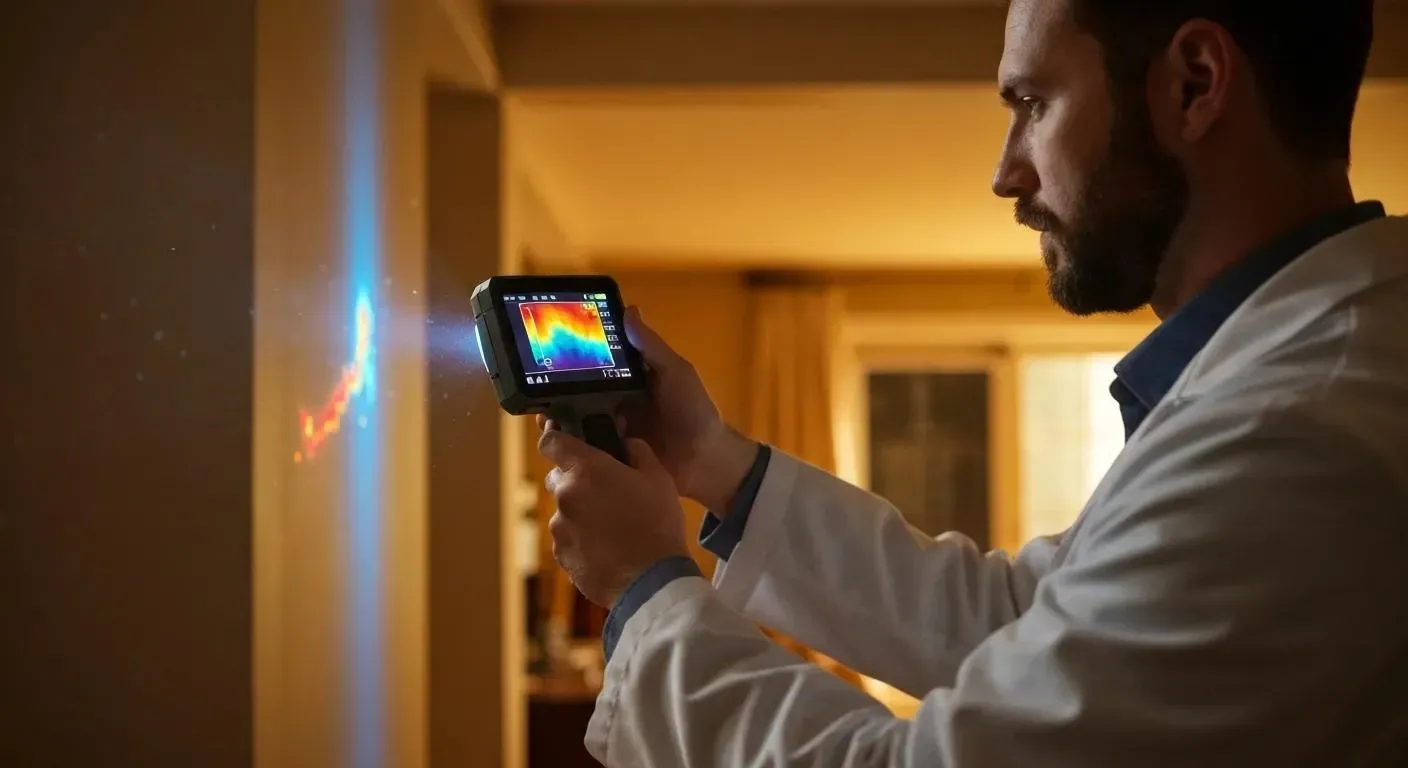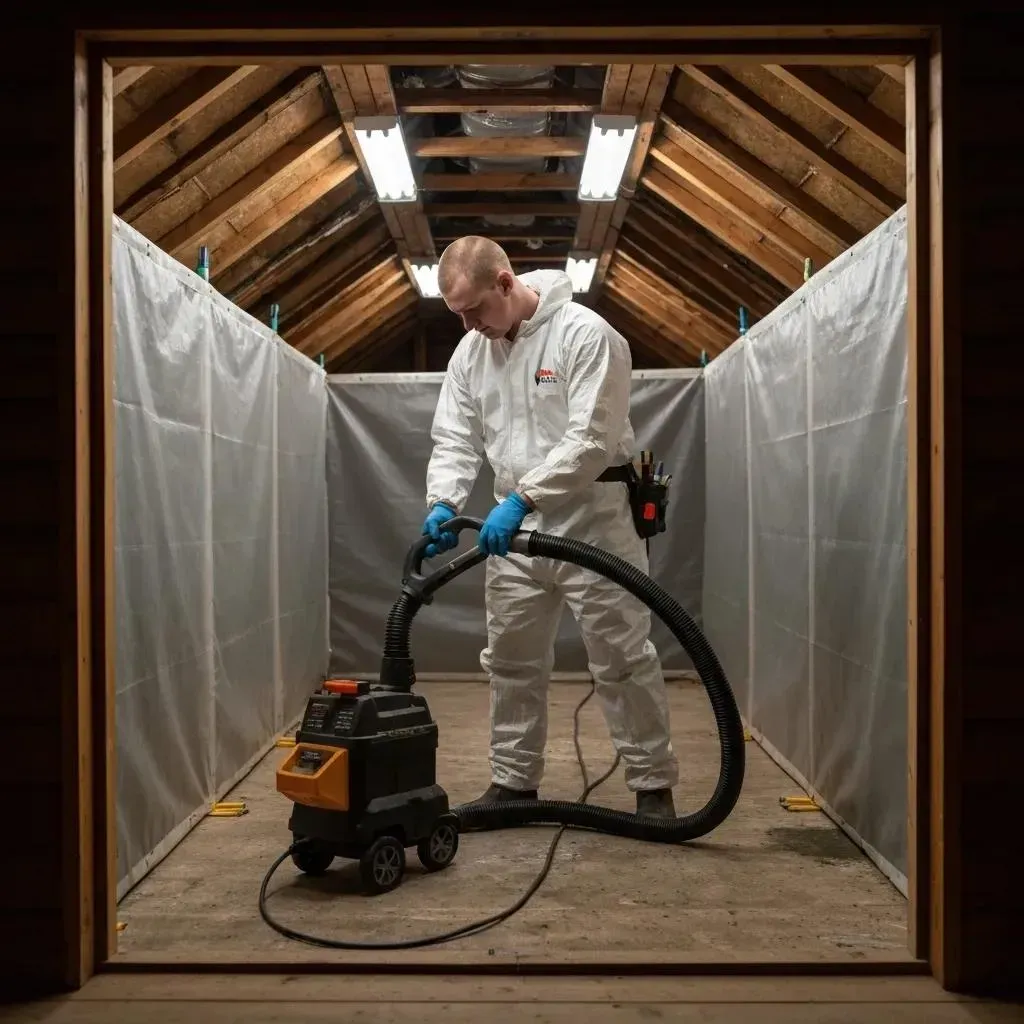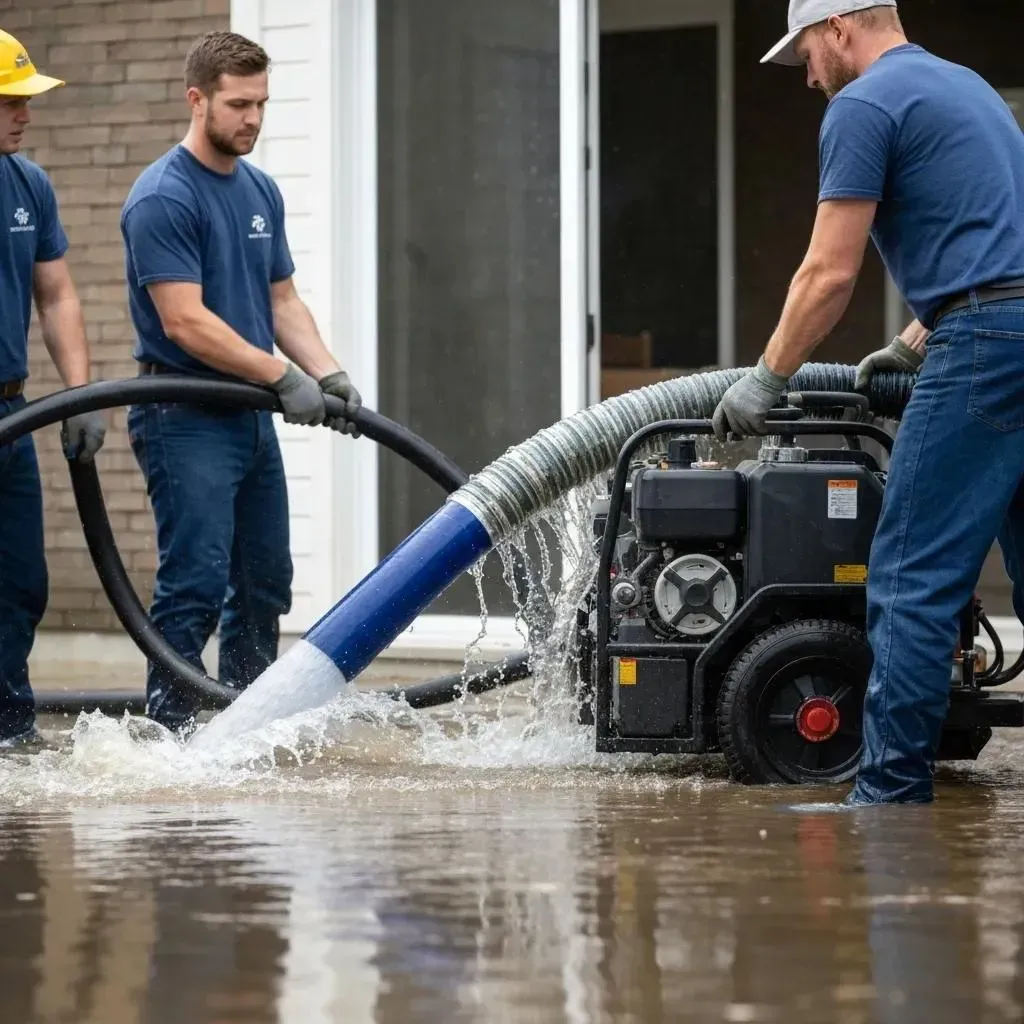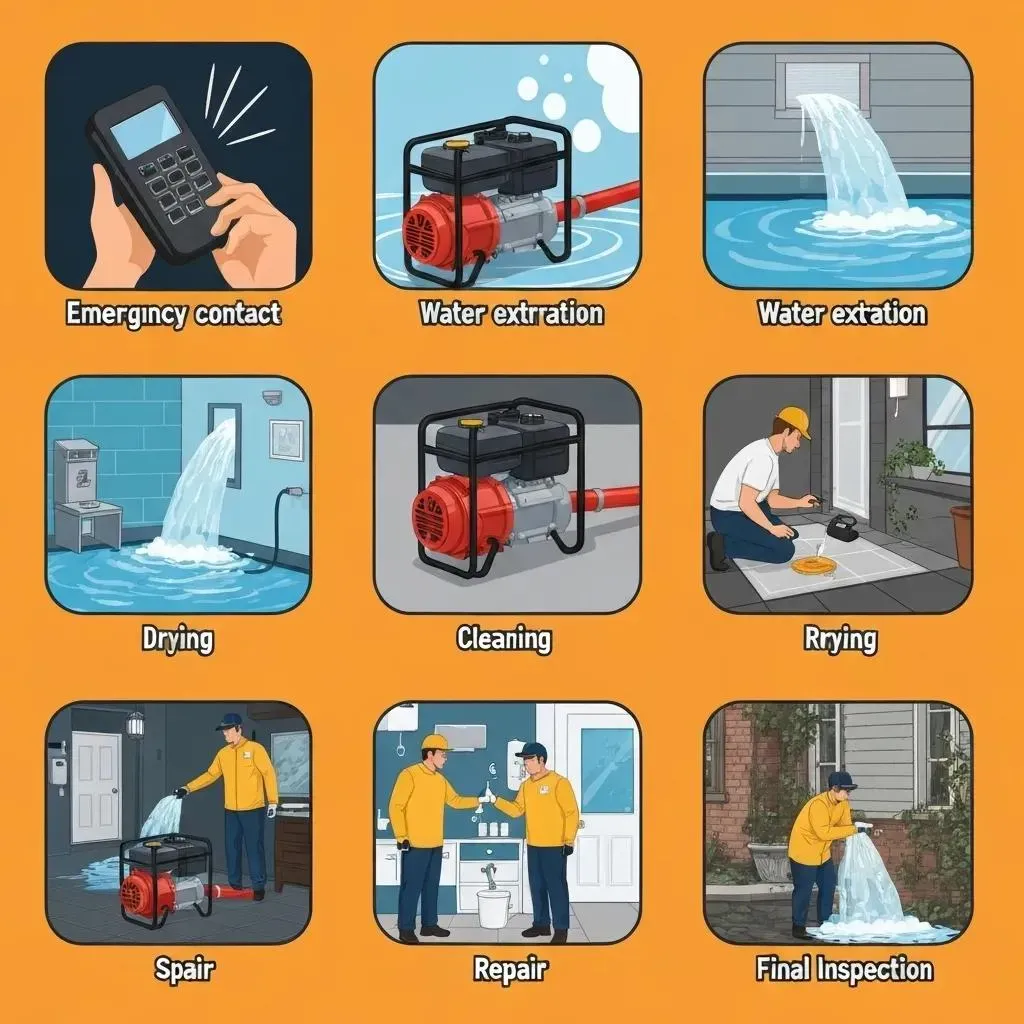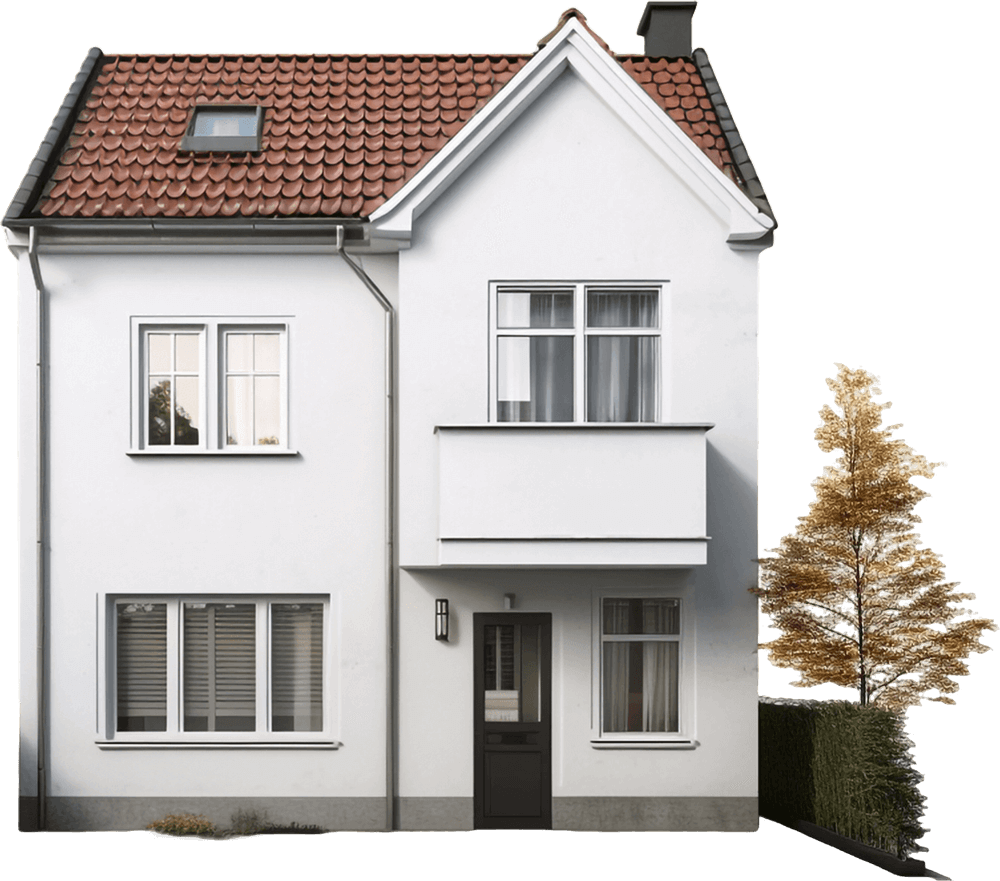Blog
When Disaster Strikes the Heart of Your Home
Kitchen fire damage repair requires immediate professional attention. A fire creates a cascade of hidden damage through smoke infiltration, soot contamination, water from firefighting, and potential structural compromise that extends far beyond what meets the eye.
Quick Action Guide for Kitchen Fire Damage:
- Safety First- Wait for official clearance before entering.
- Call Insurance- Notify your agent promptly.
- Document Everything- Take photos and videos before any cleanup.
- Contact Professionals- Get a certified restoration company assessment.
- Don't DIY- Soot contains toxic chemicals requiring specialized removal.
- Address Water Damage- Mold can develop within 24-48 hours.
The kitchen is the heart of your Denver home. When fire strikes this central space, the devastation goes beyond charred surfaces. Much of the damage occurs after the flames are out, as acidic smoke and soot corrode surfaces and water leads to hazardous mold. Even small kitchen fires leave toxic residue that poses serious health risks if not properly addressed.
I'm Mike Martinez, owner of Accountable Home Services. My team has spent years helping Denver families with kitchen fire damage repair, offering comprehensive restoration and remodeling. We understand that recovery requires specialized expertise to restore your home's safety, air quality, and structural integrity.
The First 48 Hours: Immediate Steps After a Kitchen Fire
When a kitchen fire is extinguished, the initial shock can be overwhelming. However, the first 48 hours are critical for mitigating further damage and setting the stage for a successful kitchen fire damage repair. Acting quickly during this period can save you time, money, and stress. We are here to guide you through these crucial initial steps.
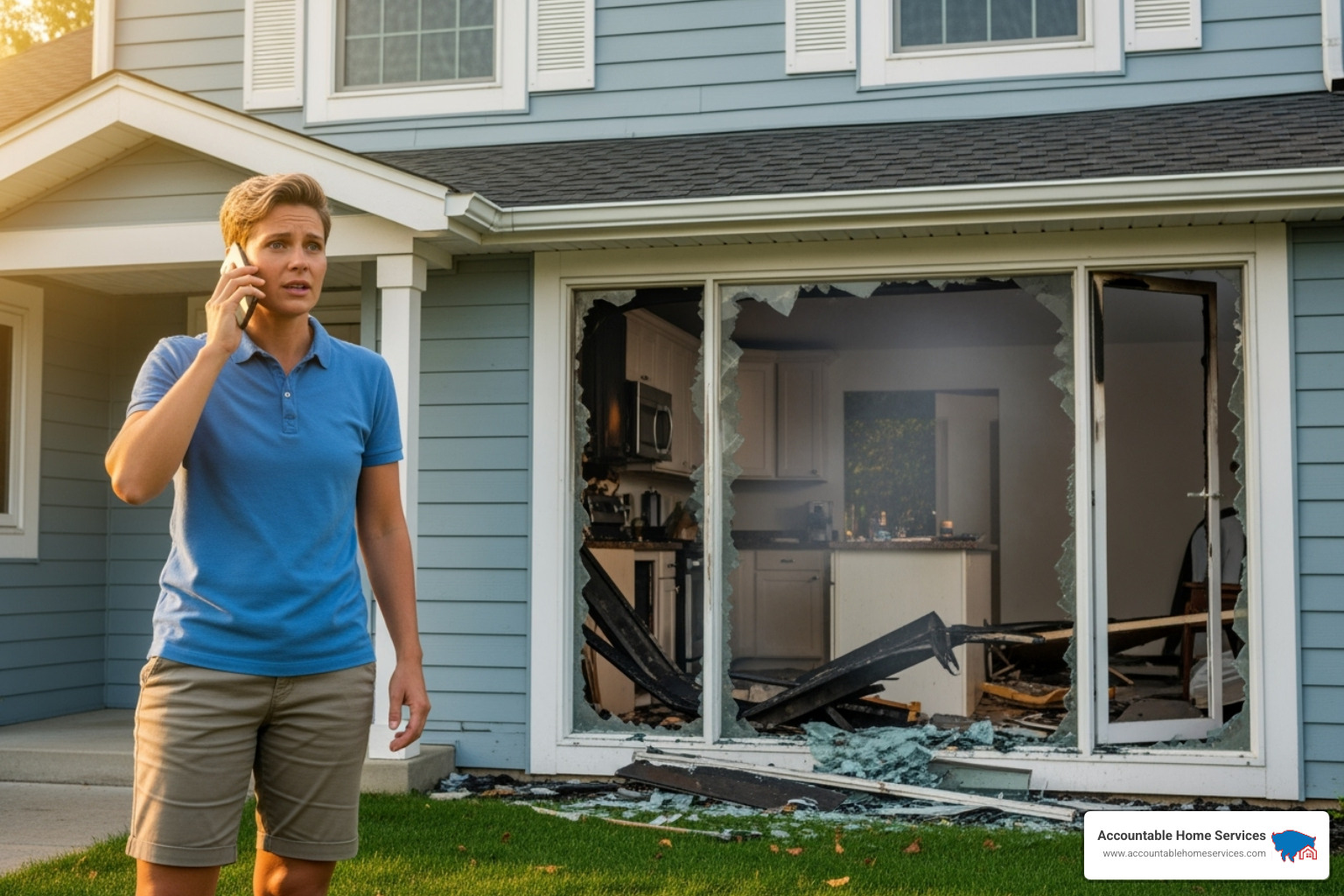
Prioritize Safety and Secure the Property
Your safety is the top priority. Before assessing the damage, ensure the area is safe to enter.
- Wait for Official Clearance: Never re-enter your home until the fire department gives you the all-clear. They will check for smoldering embers, structural instability, or dangerous fumes.
- Check for Hazards and Shut Off Utilities: Be aware of weakened floors or ceilings. If instructed by emergency personnel, ensure your home's electricity, gas, and water are shut off to prevent further hazards.
- Secure the Property: If the fire damaged windows or doors, we will help you secure your property. Boarding up openings protects it from weather damage and unauthorized entry, which is crucial for preventing secondary damage like mold.
- Limit Entry: Limit movement through affected areas to prevent spreading soot and ash and to reduce your exposure to hazardous particles.
Contact Your Insurance Company and a Restoration Professional
As soon as it's safe, make these two calls.
- Notify Your Insurance Agent: Contact your homeowners' insurance company to report the fire. We can work directly with your insurance adjuster, streamlining the process with direct insurance billing to minimize your paperwork.
- Call a Certified Restoration Company: Contact a certified company like Accountable Home Services. We offer 24/7 emergency response because quick action is key. Our IICRC certified technicians can immediately begin mitigation to prevent further issues like mold, which can grow in 24-48 hours. Our prompt response, typically within 90-120 minutes in the Denver Metro Area, is detailed on our 24/7 Emergency Property Restoration page.
Document Everything
Thorough documentation is essential for your insurance claim.
- Take Photos and Videos: Before any cleanup, take extensive photos and videos of all damaged areas and contents from various angles.
- Create an Inventory: Make a comprehensive list of every item and area impacted by fire, smoke, soot, and water. Include furniture, appliances, and personal belongings.
- Don't Throw Anything Away: Resist discarding damaged items until your insurance adjuster has seen them. We can help you determine what is salvageable versus what needs replacement. This documentation is critical proof of loss for your claim.
Beyond the Flames: Understanding the Full Scope of Damage
The flames are out, but your journey with kitchen fire damage repair is just beginning. The most destructive forces often continue their work long after the fire is extinguished. What you see is only a fraction of the total damage.
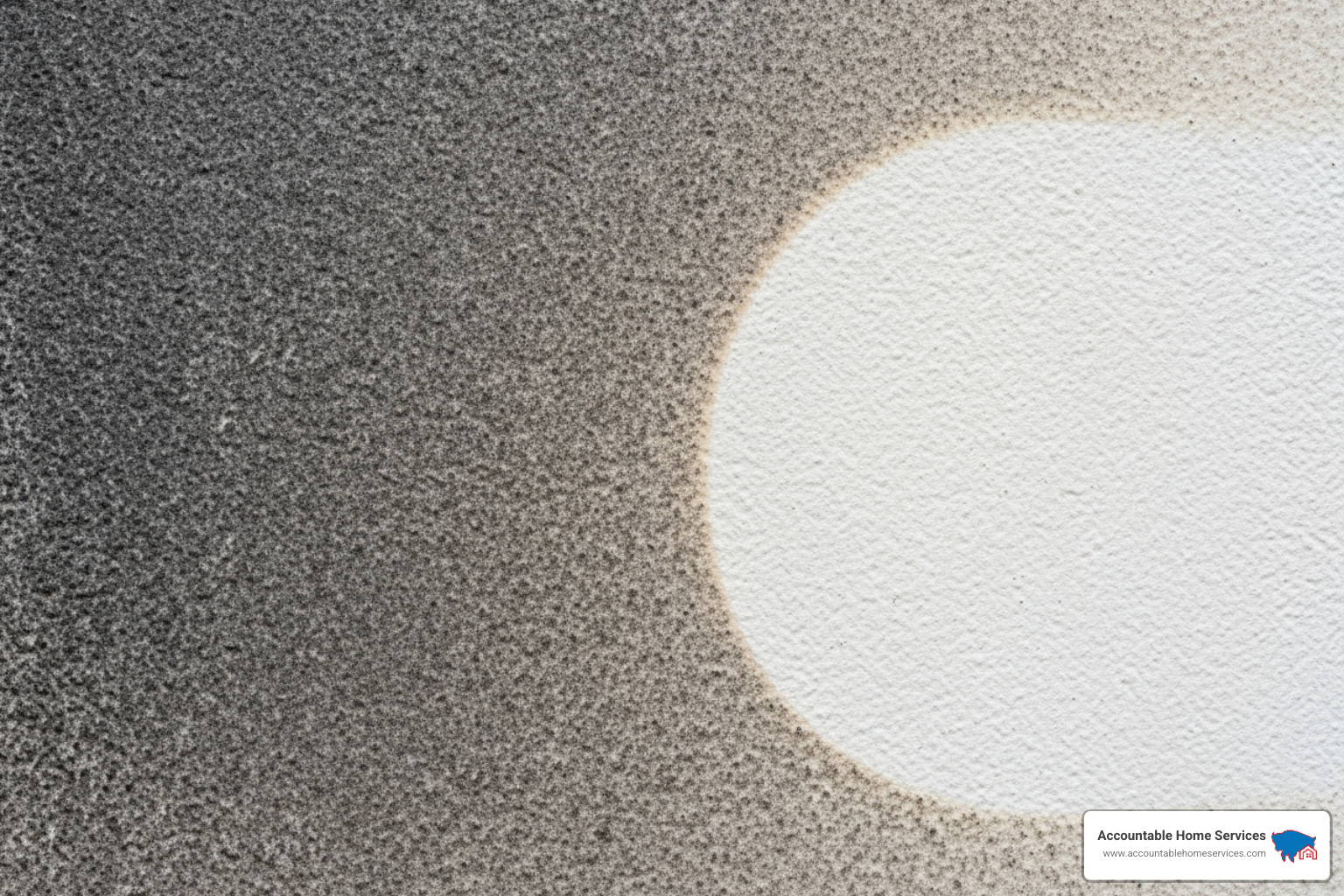
While heat and flame damage is obvious, secondary damage from smoke, soot, and water can be more extensive. Acidic soot corrodes surfaces, water leads to mold within 24-48 hours, and your HVAC system can spread contaminants throughout the house. This is why professional Fire And Water Damage Repair is critical.
Smoke and Soot Contamination
Soot isn't just dirty—it's dangerous and destructive. When synthetic materials burn, they create acidic compounds that corrode metal, etch glass, and damage plastics. Porous surfaces like drywall and wood absorb these particles and odors deep into their structure. The fine particles also pose a health risk, containing carcinogens that can trigger respiratory problems. Your HVAC system can circulate these contaminants, spreading the problem far beyond the kitchen.
Water Damage from Firefighting Efforts
The water that saved your home now presents its own challenges. It can weaken structural materials like wood framing and subflooring. Saturated drywall and insulation often require complete replacement as they lose their structural properties and become breeding grounds for bacteria and mold. The mold clock starts ticking immediately, creating a new health hazard. Furthermore, moisture can remain in electrical systems, posing ongoing safety risks.
What to Discard After a Kitchen Fire
Deciding what to keep is difficult. While you should document everything for insurance, some items cannot be safely restored.
- All food items: This includes canned, dry, refrigerated, and frozen goods. Heat can activate bacteria, and smoke contaminates packaging.
- Melted or warped plastics: These can release toxic fumes and should be discarded.
- Textiles: Items with strong, persistent smoke odors often cannot be fully restored.
- Personal care items and medications: Heat and smoke can alter their chemical composition, making them unsafe.
- Porous packaging: Cardboard and cloth absorb contaminants and are nearly impossible to clean.
Our team can help you determine what is salvageable and what poses a health or safety risk.
The Dangers of DIY: Why Professional Kitchen Fire Damage Repair is Crucial
After a kitchen fire, it's natural to want to start cleaning up yourself. However, when it comes to kitchen fire damage repair, a DIY approach can put your family at risk and make the damage worse. Even a small fire leaves behind a toxic cocktail of chemicals that requires specialized handling. This is why our Fire And Smoke Cleanup services are essential for protecting your health and your home.
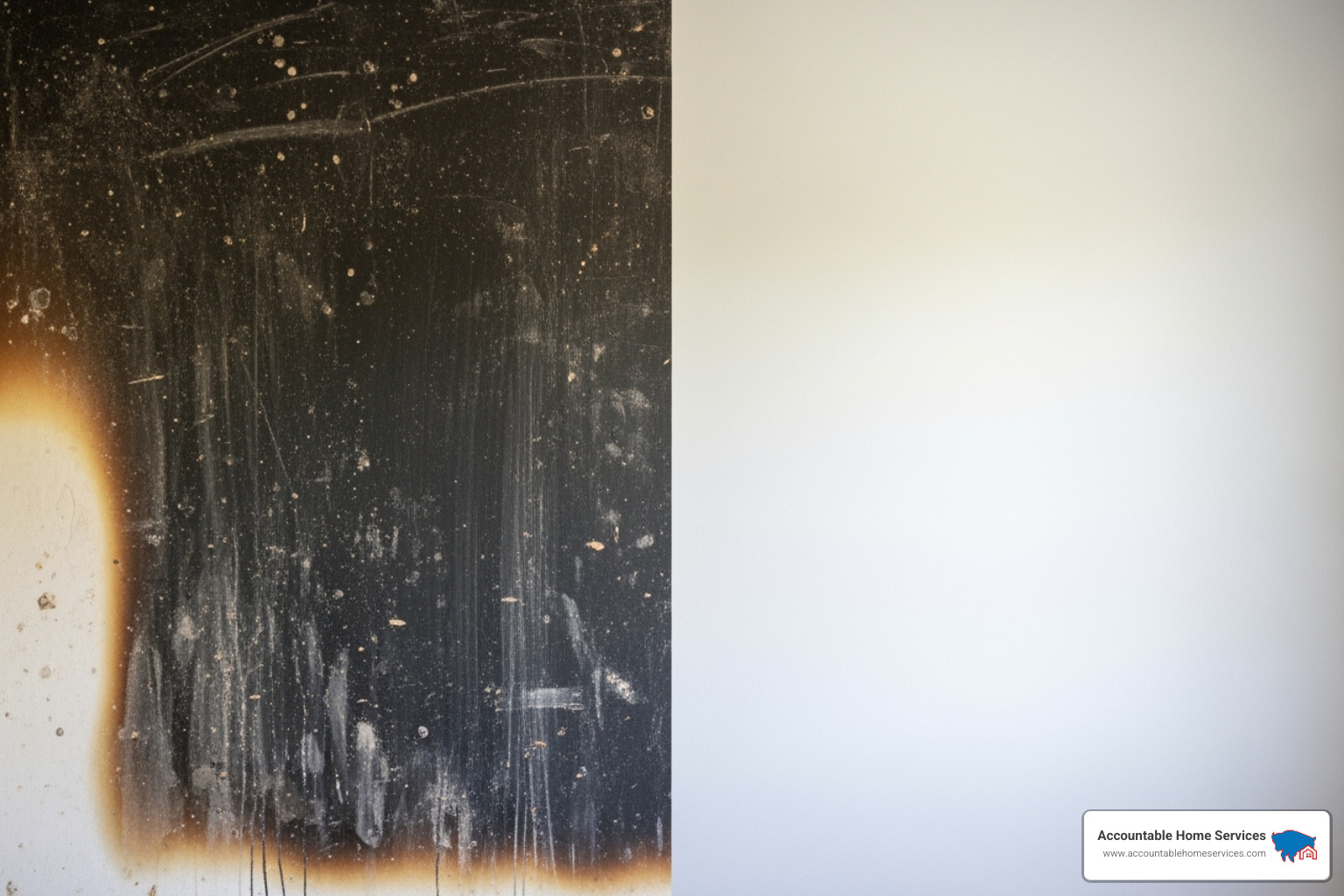
Health Risks of Soot and Smoke Residue
The black residue covering your kitchen is a serious health hazard. Microscopic soot particles contain carcinogens that become airborne when disturbed, leading to respiratory diseases. The acidic nature of soot can also cause skin irritation and chemical burns. Our certified technicians wear full protective equipment, including respirators and gloves, because they understand the dangers of exposure.
The Risk of Incomplete or Improper Cleaning
Good intentions can lead to devastating results. DIY cleanup often causes more damage than the fire itself.
- Smearing Soot: Soot from plastics has an oily base. Using water or regular cleaners can drive particles deeper into porous surfaces like walls and cabinets, causing permanent damage.
- Using Wrong Cleaners: Bleach or abrasive cleaners can react with fire residue, causing discoloration or creating dangerous gases.
- Trapping Odors: Painting over smoke-damaged walls without proper cleaning and sealing will trap odors, which will eventually bleed through the new paint.
- Missing Hidden Damage: Soot and moisture can travel into wall cavities and HVAC systems, leading to mold and structural damage that you can't see.
Lack of Professional Equipment
Effective kitchen fire damage repair requires specialized equipment not available at a hardware store.
- HEPA-Filter Vacuums: These commercial-grade systems capture microscopic soot particles that standard vacuums would blow back into the air.
- Ozone Generators and Thermal Foggers: These tools neutralize smoke odors at a molecular level, but require expert operation to be used safely and effectively.
- Air Scrubbers and Moisture Meters: Air scrubbers remove airborne contaminants, while moisture meters and industrial dehumidifiers ensure all hidden water damage is found and eliminated before it leads to mold.
Attempting DIY repair often increases total losses. Trusting our certified professionals from the start ensures your Denver home is restored safely and correctly the first time.
The Professional Restoration Roadmap: From Assessment to Rebuild
Navigating the path to recovery after a kitchen fire can feel overwhelming, but you don't have to do it alone. At Accountable Home Services, we follow a proven professional restoration roadmap to take your home from disaster to full recovery. Our expertise in insurance restoration services allows us to handle much of the burden for you.
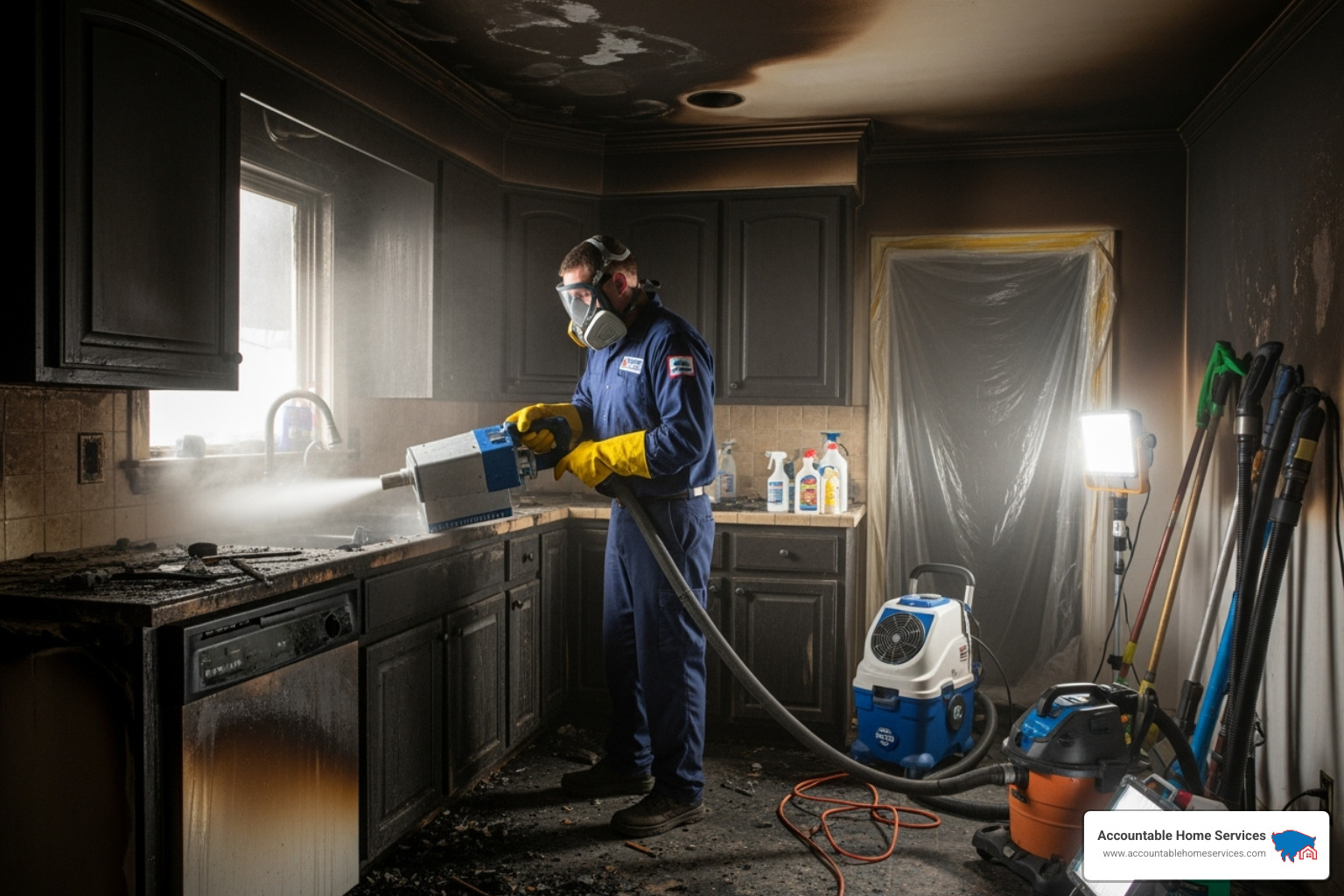
Our process combines cutting-edge technology with genuine care. We don't just restore your kitchen—we restore your peace of mind.
Step 1: Comprehensive Assessment and Insurance Coordination
A successful restoration begins with a thorough inspection. Our certified technicians identify not just obvious burns, but also hidden heat damage, how smoke traveled through your ventilation system, and where water from firefighting is hiding. We distinguish between what can be restored and what needs replacement, creating a customized restoration plan. We then work directly with your insurance adjuster, providing comprehensive documentation and itemized estimates to ensure you receive maximum coverage while you focus on your family.
Step 2: Water Removal and Soot Cleanup for kitchen fire damage repair
With a plan in place, we act fast. Time is critical to prevent mold growth, which can start within 24-48 hours.
- Water Mitigation: We use industrial-grade extractors, high-capacity air movers, and dehumidifiers to remove standing water and pull moisture from deep within structural elements.
- Soot Removal: Soot requires a special approach. We use dry chemical sponges to lift residue without smearing it. We then apply specialized cleaning solutions custom to each surface type—from granite to wood to metal—to clean thoroughly without causing more damage.
Step 3: Advanced Smoke and Odor Elimination for kitchen fire damage repair
Cleaning visible damage isn't enough; eliminating smoke odor is crucial for your family's health and comfort. We use advanced techniques to ensure odors are gone for good.
- Odor Neutralization: We use thermal fogging to send deodorizing agents into the same tiny cracks that smoke penetrated. Ozone and hydroxyl generators work at a molecular level to chemically neutralize odor molecules.
- Sealing and HVAC Cleaning: For porous surfaces, we apply specialized odor-blocking primers before painting. We also thoroughly clean your entire HVAC system and replace filters to prevent smoky air from recirculating. Learn more on our Smoke Damage Restoration Denver page.
Step 4: Repair, Restoration, and Remodeling
This is where your kitchen transforms back into the heart of your home. As a full-service general contractor, we handle every aspect of the reconstruction.
- Structural and System Repairs: We address any compromised framing or supports to ensure your home is structurally sound. We also inspect and repair electrical and plumbing systems, bringing them up to current codes for added safety.
- Rebuilding and Finishing: We replace damaged materials like drywall and insulation with high-quality alternatives. We then expertly install new cabinets, countertops, and flooring. Professional painting and finishing touches complete the restoration, returning beauty and comfort to your space.
This can also be an opportunity to upgrade. Our Kitchen Remodels Denver services can help you create the kitchen you've always wanted. Our goal is to return your home to its pre-fire condition, or even better.
Prevention is the Best Policy: Safeguarding Your Denver Kitchen
While we are always here to help after a kitchen fire, prevention is the best approach. Most house fires start in the kitchen, but simple safety measures can significantly reduce the risk of needing kitchen fire damage repair in your Denver home. These precautions don't require expensive equipment, just awareness and good habits.
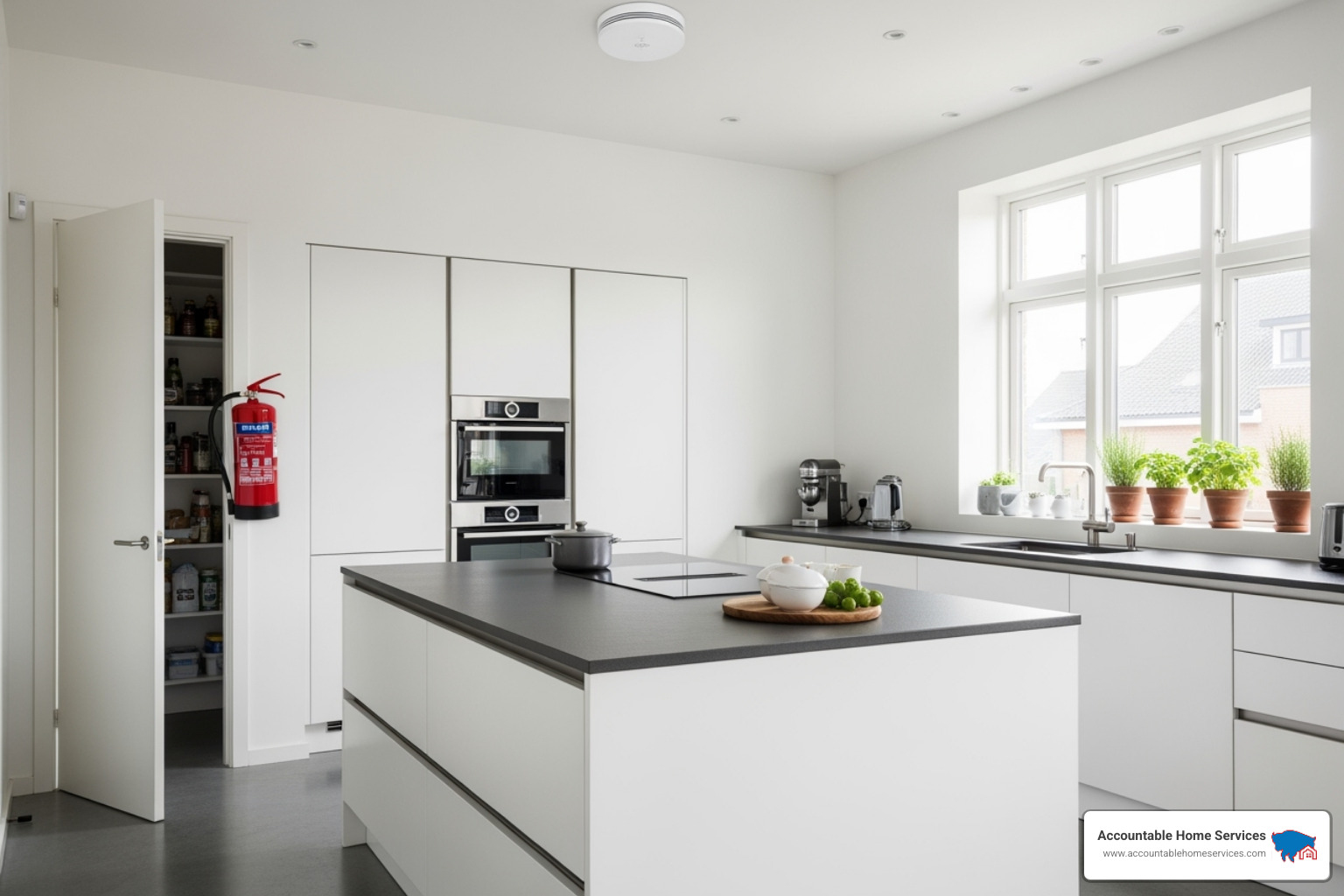
Safe Cooking Habits
The majority of kitchen fires stem from simple cooking mistakes.
- Never leave cooking unattended. This is the golden rule. If you must leave the room, turn off the stove.
- Keep flammable items away from the stovetop. Create a three-foot safety zone around your cooking area, clear of paper towels, oven mitts, and curtains.
- Clean up grease buildup. Regularly clean your stovetop, oven, and exhaust fan to remove flammable grime. If a grease fire starts, cover it with a metal lid or use baking soda—never water.
- Handle hot oil carefully. Heat oil slowly and turn off the heat if it starts to smoke.
Equipment and Maintenance
Proper equipment and regular maintenance add layers of protection.
- Inspect appliance cords regularly and replace any that are frayed or damaged.
- Avoid overloading circuits, especially in older homes. Don't plug multiple high-wattage appliances into one circuit.
- Install and test smoke alarms. Use hard-wired, interconnected units with battery backup on every level and in/outside sleeping areas. Test them monthly.
- Keep a Class B or ABC fire extinguisher accessible in the kitchen and ensure everyone knows how to use it.
- Schedule annual professional maintenance for your furnace, chimneys, and fireplaces.
We encourage all Denver homeowners to create a fire safety plan and practice it with your family. A few minutes of preparation can prevent the need for kitchen fire damage repair.
Conclusion
A kitchen fire is a traumatic experience, and the aftermath reveals damage that extends far beyond what's visible. Kitchen fire damage repair is a complex process that involves addressing hidden dangers from smoke, soot, and water to ensure your family's safety and your home's integrity. The path to recovery requires professional expertise, as attempting to handle it yourself can be dangerous and lead to more expensive problems.
At Accountable Home Services, we understand your kitchen is the heart of your home. As a family-owned business, we are committed to being Denver's trusted partner throughout your restoration. Our certified technicians use cutting-edge equipment and follow strict safety standards to complete your kitchen fire damage repair quickly and thoroughly. We handle everything from 24/7 emergency response and direct insurance billing to the final touches of remodeling, minimizing your stress.
We serve communities throughout the Denver Metro Area, including Westminster, Broomfield, Boulder, Thornton, Northglenn, Arvada, Longmont, and Erie. We're here to restore not just your property, but your peace of mind.
Ready to restore the heart of your home? Learn more about our expert kitchen remodel services and find how we can help you create a kitchen that's even better than before.

